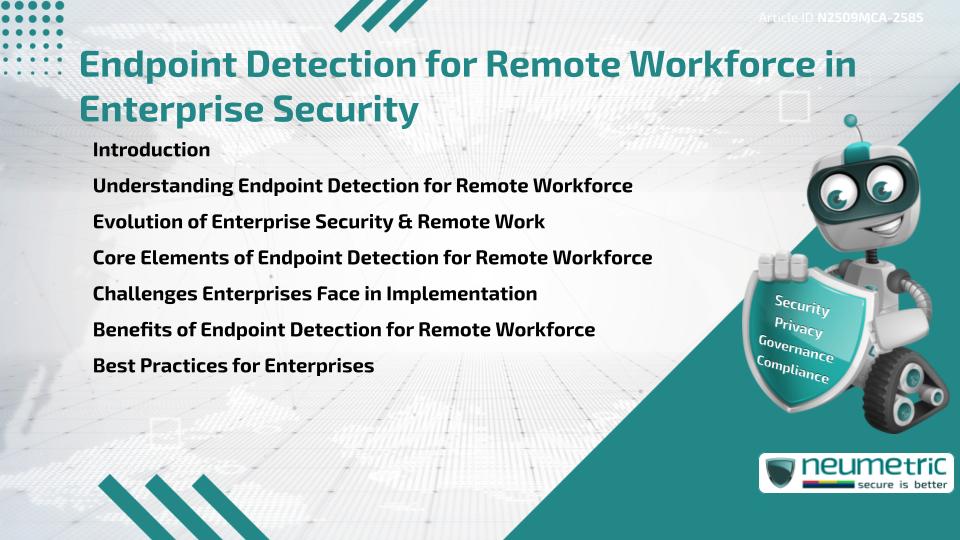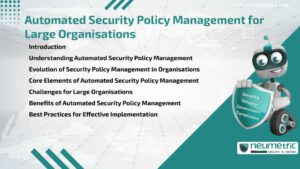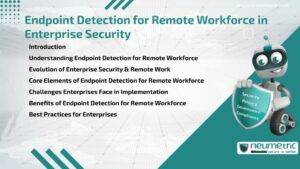Table of Contents
ToggleIntroduction
Endpoint Detection for Remote Workforce is a Critical Component of Enterprise Security in today’s Digital Environment. With Employees working from Home or across Distributed Locations, Endpoints such as Laptops, Tablets & Smartphones become the frontline of Defense. Without Robust Endpoint Detection, Enterprises Risk Breaches, Data Theft & Compliance failures. This article explores what Endpoint Detection for Remote Workforce means, its Evolution, challenges, benefits & best practices for Enterprises.
Understanding Endpoint Detection for Remote Workforce
Endpoint Detection for Remote Workforce involves monitoring, analyzing & responding to Threats across all Devices used by Remote Employees. Much like Security cameras monitor Physical spaces, Endpoint Detection Solutions provide visibility into Device activities, ensuring that suspicious behavior is detected quickly. For Enterprises, it is not just about preventing malware but also ensuring Compliance with Security Policies.
Evolution of Enterprise Security & Remote Work
Traditional Enterprise Security relied heavily on Perimeter defenses such as Firewalls & On-premise monitoring. However, the rise of Cloud Computing & Remote work shifted the Attack Surface to Individual Devices. Events like the COVID-19 Pandemic accelerated this trend, making Endpoint Detection indispensable. Frameworks like NIST CyberSecurity Framework & ISO 27001 highlighted the importance of Continuous Monitoring, pushing Enterprises to adopt Advanced Endpoint Detection Tools.
Core Elements of Endpoint Detection for Remote Workforce
Effective Endpoint Detection includes:
- Threat Monitoring: Continuous Scanning for Malware, Phishing & Ransomware.
- Behavioral Analysis: Identifying unusual patterns that may indicate Compromise.
- Incident Response: Containing & Remediating Threats in real time.
- Data Protection: Ensuring Encryption & Secure Access for Sensitive Information.
- Integration: Connecting Endpoint Tools with Enterprise Security Platforms for unified visibility.
Together, these elements form a comprehensive Shield for Distributed Enterprises.
Challenges Enterprises Face in Implementation
Enterprises face several hurdles in deploying Endpoint Detection for Remote Workforce. Managing diverse Devices & Operating Systems increases complexity. Smaller businesses may lack Resources for advanced solutions, while larger Enterprises struggle to scale monitoring across thousands of Endpoints. Privacy concerns also arise, as Monitoring Tools must balance Security with Employee trust. Additionally, Constant Alerts can overwhelm Security Teams if not managed effectively.
Benefits of Endpoint Detection for Remote Workforce
The benefits are significant. Endpoint Detection strengthens Security Posture, reduces the Risk of Breaches & Ensures Compliance with regulations. It also enables faster response to Incidents, minimizing Downtime & Financial impact. For Employees, it provides reassurance that their Devices are protected. Much like an Always-on Alarm System, Endpoint Detection keeps Enterprises vigilant & prepared.
Best Practices for Enterprises
To maximise effectiveness, Enterprises should:
- Deploy Endpoint Detection Solutions that integrate with existing Security Infrastructure.
- Conduct regular Updates & Patch Management for all Devices.
- Train Employees to recognize suspicious activity.
- Use automation to reduce the burden on Security Teams.
- Regularly review Endpoint Detection Policies to align with evolving Threats.
Embedding these practices ensures Endpoint Detection is not a Standalone Solution but part of a Holistic Enterprise Security Strategy.
Conclusion
Endpoint Detection for Remote Workforce is a Cornerstone of Enterprise Security. It provides visibility, rapid Response & Compliance in an Era where Remote work is the norm. By addressing challenges & applying Best Practices, Enterprises can Safeguard their Distributed Workforce effectively.
Takeaways
- Endpoint Detection protects Remote Devices from Cyber Threats.
- Core Elements include monitoring, analysis, response & integration.
- Challenges include Device Diversity, Scaling & Privacy Concerns.
- Benefits include reduced Risks, Stronger Compliance & Faster Response.
- Best Practices embed Detection into Enterprise Security Culture.
FAQ
What is Endpoint Detection for Remote Workforce?
It is the process of monitoring & responding to Threats across Devices used by Remote Employees.
Why is Endpoint Detection important for Enterprises?
It protects against Breaches, ensures Compliance & strengthens overall Security.
What challenges arise in Endpoint Detection?
Challenges include scaling across diverse Devices, managing alerts & balancing Privacy with monitoring.
How can Enterprises improve Endpoint Detection?
By integrating Tools, Training Employees, Automating Processes & Keeping Systems updated.
Does Endpoint Detection replace other Security Measures?
No, it complements other measures such as Firewalls & Network monitoring to create layered Security.
References
- NIST CyberSecurity Framework
- ISO 27001 Information Security Standard
- European Union Agency for CyberSecurity (ENISA) Guidelines
- HIPAA Journal on Endpoint Security
- World Economic Forum on CyberSecurity
Need help for Security, Privacy, Governance & VAPT?
Neumetric provides organisations the necessary help to achieve their CyberSecurity, Compliance, Governance, Privacy, Certifications & Pentesting needs.
Organisations & Businesses, specifically those which provide SaaS & AI Solutions in the Fintech, BFSI & other regulated sectors, usually need a CyberSecurity Partner for meeting & maintaining the ongoing Security & Privacy needs & requirements of their Enterprise Clients & Privacy conscious Customers.
SOC 2, ISO 27001, ISO 42001, NIST, HIPAA, HECVAT, EU GDPR are some of the Frameworks that are served by Fusion – a SaaS, multimodular, multitenant, centralised, automated, CyberSecurity & Compliance Management System.
Neumetric also provides Expert Services for technical Security which covers VAPT for Web Applications, APIs, iOS & Android Mobile Apps, Security Testing for AWS & other Cloud Environments & Cloud Infrastructure & other similar scopes.
Reach out to us by Email or filling out the Contact Form…





